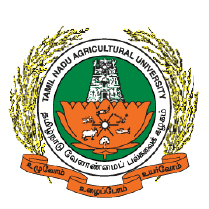Born into a modest farming family in the quaint village of Kittampatti, located in the Erode district of Tamil Nadu, I embarked on an academic journey that would shape my career. My educational foundation was laid at Tamil Nadu Agricultural University (TNAU), Coimbatore, where I earned both my undergraduate and postgraduate degrees in Agricultural Engineering.
My foray into academia began at TNAU, where I dedicated myself to advancing knowledge in biomass gasification, culminating in the successful completion of my Ph.D. Over the years, my expertise expanded across diverse domains, including solar energy, biofuels, biochar, nano-carbon tubes, and more, as I actively engaged in numerous research projects and experiments.
Recognized for my administrative prowess, I assumed leadership roles as the head of the Bioenergy department and the Chief Warden at TNAU's main campus. Juggling these responsibilities concurrently, I spearheaded the implementation of various developmental initiatives. Throughout my academic and research tenure spanning 28 years in the public sector, I received numerous awards and accolades in recognition of my contributions to teaching, research, and outreach services.
In pursuit of continuous learning, I acquired certifications as an Energy Manager and Energy Auditor, enabling me to undertake diverse energy consultancy projects. My journey at TNAU concluded in 2015 upon my retirement. Currently, I share my wealth of knowledge as a visiting faculty and advisor to various agricultural institutions and private companies.
Academic Accomplishments @ TNAU
Prof P Venkatachalam has pioneered the creation of innovative degree programs and curricula, including B.Tech. (Energy & Environmental Engineering), B.Farm Tech, PG Diploma in Energy Management, and several other programs for TNAU and various other universities. His impactful contributions extend to serving on TNAU's Academic Council, Board of Studies, and similar roles in other institutions, actively participating in curriculum design. In recognition of his dedication to teaching, he was honored with the Best Teacher Award by TNAU in 2010.
Prof Venkatachalam has played a crucial role as a resource person in developing e-learning materials for B.Tech. (Agrl. Engineering) and B.Sc (Agri) courses. His teaching engagements cover a broad spectrum, encompassing undergraduates, postgraduates, and Ph.D. students in diverse life science domains such as Agricultural Engineering, Food Process Engineering, Energy & Environmental Engineering, Agriculture, Horticulture, and more. With a commitment to mentorship, he has guided postgraduate students in both India and Canada.
Research Accomplishments
In his research endeavors, Prof P Venkatachalam has pioneered various agricultural technologies, introducing innovations such as bioenergy production facilities for biodiesel and gasifiers, solar tunnel dryers to enhance the drying of agro-products, and efficient agro-waste management through briquetting mechanisms. Over the course of his career, he successfully led and completed 20 independently sponsored projects, securing an impressive sum of Rs 270 million (Rs 27 crores) in funding.
His contributions have not gone unnoticed, as evidenced by the recognition bestowed upon him. Prof P Venkatachalam was honored with the Best Researcher Award from TNAU and the prestigious Ramasastrulu Mungala Prize for Best Research in Agriculture from MASU. Additionally, he played a pivotal role in the establishment of the Center of Excellence in Bio Fuels at TNAU, solidifying his position as one of the key architects behind this significant initiative.
Outreach Accomplishments
Prof P Venkatachalam played a pivotal role in conceiving and bringing to fruition the Renewable Energy Park. This innovative initiative garnered attention from a diverse audience, attracting researchers, students, farmers, agri-preneurs, and the general public, including influential agricultural policy makers.
His commitment to knowledge dissemination extended to conducting over a thousand training programs. These programs targeted farmers, biogas users, and civil construction employees involved in the application of biogas technology. During his tenure as an Assistant Professor at KVK (1994 to 1998), he introduced a novel approach to technology transfer through the institution-village linkage program, supported financially by the Indian Agricultural Research Council (ICAR).
In recognition of his outstanding contributions, Prof P Venkatachalam received the Best Extension Worker Award from TNAU in 2006. His dedication to extending knowledge is further evident in his prolific body of work, including the creation of a substantial volume of extension literature. This includes the publication of over 100 popular articles, 50 booklets, and the preparation of 30 news items for widely read Tamil and English newspapers.
Institution Building
Prof P Venkatachalam has championed the introduction of renewable energy technologies within university and college premises, encompassing the generation of biogas-based electricity and the implementation of solar hot water systems. He has played a pivotal role in establishing state-of-the-art laboratories and enhancing infrastructure to support the newly instituted B.Tech core courses.
In his capacity as Chief Warden, Prof P Venkatachalam has spearheaded innovative initiatives in student hostels, revolutionizing processes such as computerizing hostel accounts, modernizing energy-efficient kitchens, implementing a biomedical waste disposal incinerator, and introducing cooking mechanization. Additionally, he has laid the foundation for a Pilot Paper Plant, dedicated to producing paper files from waste materials to fulfill university-wide demands.
With a career spanning nearly three decades, Prof P Venkatachalam has actively engaged in academic, research, outreach, and institution-building endeavors. This includes forging connections with both national and international institutions and securing external funds to create essential resources. His global involvement extends to visits to the U.S.A, Canada, Germany, Israel, the United Kingdom, Singapore, and Malaysia, where he participated in training programs, facilitated mutual exchange of scientific ideas, and undertook various research assignments.





